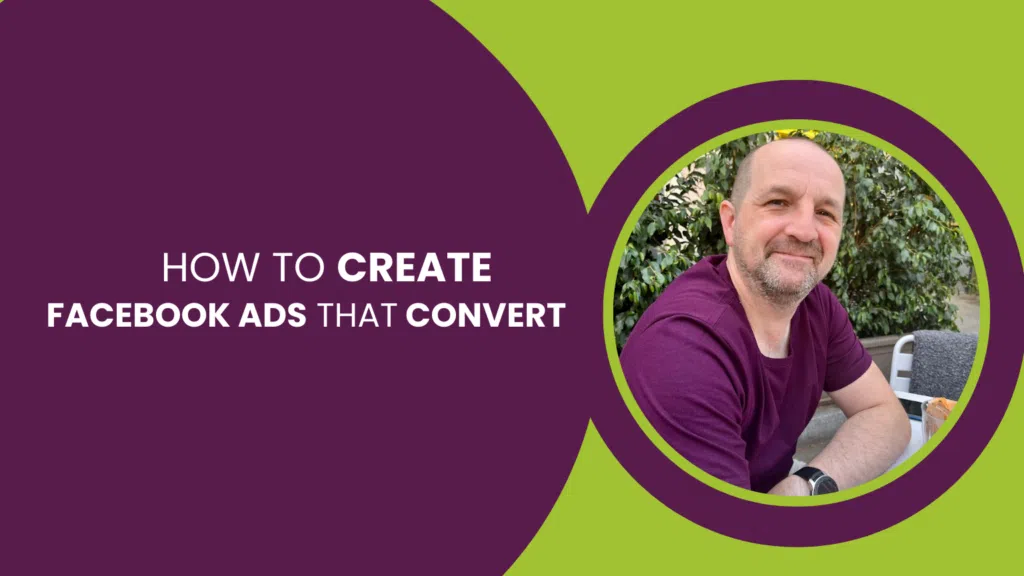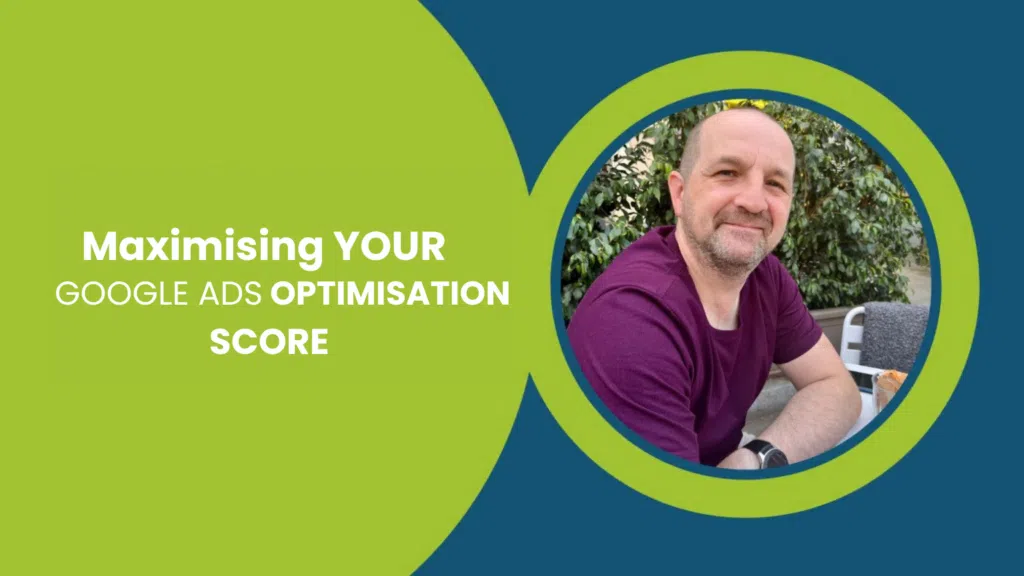Your rankings improved as you’ve invested time and effort in search engine optimisation, but compared to earlier periods, your organic traffic is down.
In this post, we explore the reasons why your organic traffic is down and look at what you can do to increase it.
Rankings are better, but organic traffic is down on the previous year
You may be focusing on high volume search terms, but forgetting dozens or hundreds of niche, long tail terms which ranked deeper content within your site. Check Google Analytics for landing pages on your site and compare the two periods. Identifying which pages have increased or decreased in organic traffic might help to identify the problem.
Again, using Google Analytics, compare organic traffic for different devices to see if traffic losses are more significant on desktop, mobile devices or tablets. Changes in online behaviour and the algorithm have been significant with the growth of mobile traffic [link] especially disruptive.
Offline and top of funnel activity has decreased
It’s possible that much of your traffic from the earlier period wasn’t generated by organic rankings alone.
Brand activity in the top of the funnel can create a significant volume of brand, and general search traffic. If that brand activity wasn’t repeated or replaced, that could create a significant decrease in organic traffic.
When a brand sponsors an event, it creates brand search traffic – you should notice a spike in brand search traffic around the time of the event. Running a Facebook Ads campaign creates awareness and interest in an event you’re running or exhibiting at, which then creates organic search traffic. When the Facebook campaign stops, that organic traffic stops too.
See: Why Your Facebook Ads Aren’t Converting
If you’re featured in a TV show, have radio ads running or do a leaflet drop, those activities will all create organic, brand traffic. If those were part of your marketing strategy last year, but not this year, that could significantly reduce organic traffic, even if your rankings are higher.
Check Google Analytics, comparing periods when significant brand activity was undertaken. This should identify whether brand activity (or a reduction of brand activity) is the culprit for declining organic traffic.
See: Measuring Brand Value Signals
Google AdWords search is stealing your brand traffic
It may look like organic traffic is down, but in reality, it just moved. If you choose to bid on your own brand in Google AdWords search campaigns (here’s why you should [link]), that could explain why organic traffic is down on the previous year too.
Paid search stopped or reduced
You may have been running Google AdWords Search or Google Shopping campaigns last year and stopped them this year, or perhaps just reduced the budget.
Similar to the top of funnel activity, more volume in the middle funnel (Search Marketing) creates repeat searches and brand searches. Contrary to what we might expect, users rarely convert on the first click, creating journeys across multiple channels before they convert into a lead or a sale.
See: Understanding Multi-Channel Funnels
Brand activity and paid search activity can significantly increase organic traffic
If that activity were present last year, but not this year, your organic traffic could be down.
Using Google Analytics, compare the period immediately before and immediately after Paid Search Campaigns were enabled, disabled, increased or decreased to identify whether this is the cause of your declining organic traffic.
Recently organic traffic is down, but rankings are higher
Assuming that you’ve checked the potential causes above and they don’t explain the decline in organic traffic, there are some other causes worth investigating.
Seasonality can play a huge part in traffic. Make sure that you’re comparing like-for-like. There’s no point in comparing organic traffic for Christmas trees in November and December versus January and February. An extreme example, but illustrates the point.
There could be seasonal variation in search volume. Usually, it’s more meaningful to compare year-on-year data rather than month by month.
Using Google Analytics, compare organic traffic year on year, as well as quarter on quarter, or month on month. So it may help to understand the change in organic traffic.
Use Google Trends to identify changes in seasonal search volume, or whether there’s a general decline in search volume in your market.
Why Is My Local Organic Traffic Dropping?
A client approached our SEO Specialists, reporting a significant drop in organic traffic over a period of a year or so.
They had been investing in Search Engine Optimisation (SEO) techniques, ranking pages on their site for hundreds of local search terms , with search queries that included a town and a service.
Our first investigation was to analyse the usual suspects; drops in rankings or a reduction in search volume.
Current rankings were pretty strong. Hundreds of search terms were ranked in the top three organic results. Since no ranking data was available from the previous year, we analysed Google Analytics data to compare organic traffic landing on relevant pages on the website, noting an alarming trend that each had suffered a decline across all devices.
Desktop traffic had dropped the most, with mobile organic traffic more moderate and in some cases, even staying constant.
This wasn’t a device-specific issue. Mobile search had increased and continues to – more and more users are searching the web using mobile devices. That increase was counteracting the decrease the site was suffering.
Trends:
Analysing Google Trends data, our SEO Specialists established that this wasn’t a market trend either. Volumes had remained constant, or increased slightly.
Frustratingly, traffic hadn’t suddenly plummeted on a specific day, or even during a particular week or month. That would have help identify the cause; an algorithm update, a significant site change perhaps. No, this was gradual, over a period of a year, even allowing for seasonal variation in search behaviour.
With more analysis of a range of different search terms, we discovered a significant pattern; location searches for services (electrician Portsmouth) had suffered a drop, but location searches for events (exhibitions Portsmouth) had not.
That revealed the cause of the reduction in local organic traffic; Google had changed the way it presented search results for local searches.
More specifically, searches that represented physical and permanent locations such as shops, hotels, restaurants, accountants and Digital Marketing agencies were affected. Searches which represent temporary locations like fairs, concerts and such were not affected.
From 2016, Google subtly introduced changes to how local search results were presented; the Local Stack. Learn SEO with a Pro
What is the Local Stack?
You may have noticed that Google delivers different types of results for different types of queries:- “How to” searches are more likely to present video results.
– Product searches are more likely to present Google Shopping ads rather than standard AdWords text ads.
– Local searches are more likely to present local business results (or Google Maps results).
– Somewhere in that set of results, Google also delivers organic results. The Local Stack is effectively a set of relevant results from Google Maps, created by businesses using Google My Business. The image below shows Google search results for a local business: – The Green Box is sponsored ads served by Google AdWords. They dominate the page above the fold (the green arrow is the fold on a pretty big monitor – on mobile devices, the fold is a lot higher). – The Blue box is the Local Stack, or Maps results. Three businesses are listed in this example, though many local searches might present four results. – The Red box is the Organic listings. Way down below the fold, making the user scroll further and yes, you guessed it, reducing the Click Through Rate and therefore organic traffic.
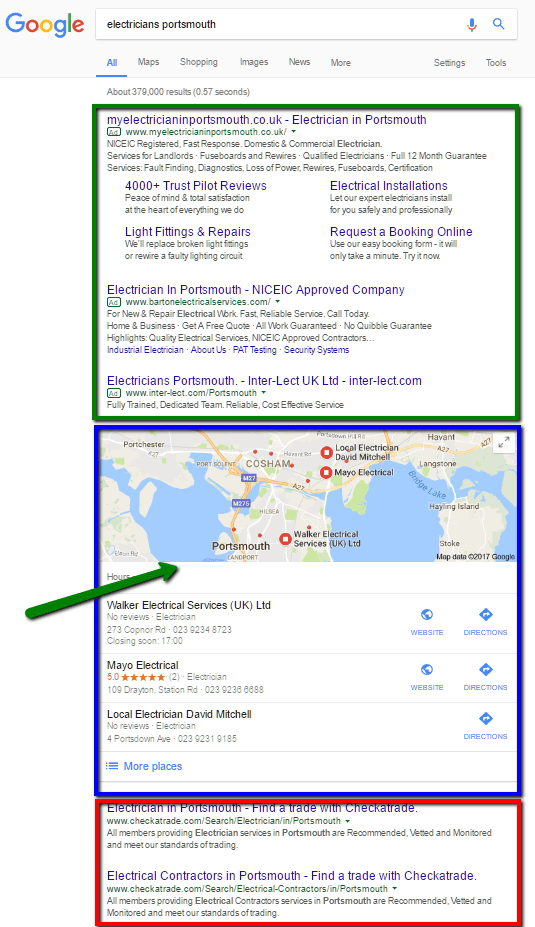
This is what had significantly changed in that period.
In 2016, Local Stack results were less prominent for location searches. Fewer results were shown, with more text ads and the Organic Stack showing higher up the page.
In 2017, the Local Stack dominates results for those same location searches, more local results are listed in that stack, pushing some of the AdWords text ads to the bottom of the page and more importantly for us, pushing organic results below the fold.
On mobile devices where there’s less screen to go around, the Local Stack dominates even more.
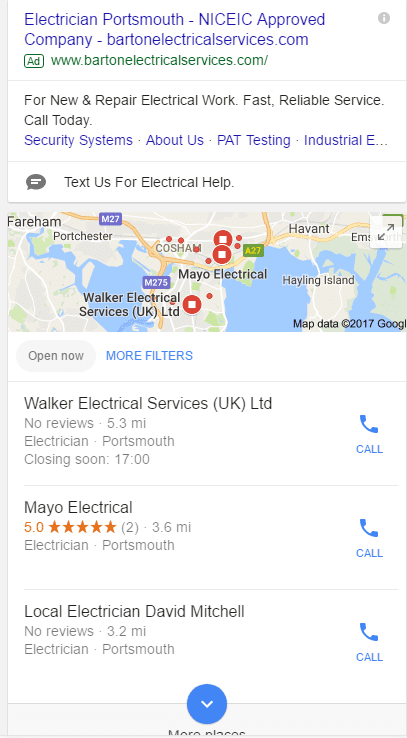
Positions within the Organic Stack had remained constant or had improved. The reason this website was earning less local organic search traffic was not due to rankings, it was a significant change in the presentation of local search results.
How to Combat The Drop in Local Search Traffic:
Local businesses wanting to attract local search traffic should still invest in Search Engine Optimisation. There’s still a ton of free traffic available, even if you get a smaller percentage than in 2016. It’s still worth optimising pages to rank for local search terms and earning some local links. However, making sure you have a solid, well-optimised, verified Google My Business page is also strongly recommended. If you want to regain that lost organic traffic, your business needs to be ranked high in the Local Stack.
In your Google My Business page, relevance signals are important – correct business categories, your business description includes relevant, semantically related search terms and so forth, but there are two equally critical ranking signals which we explore in this video from ”How to Improve Your Google Local Listing.”
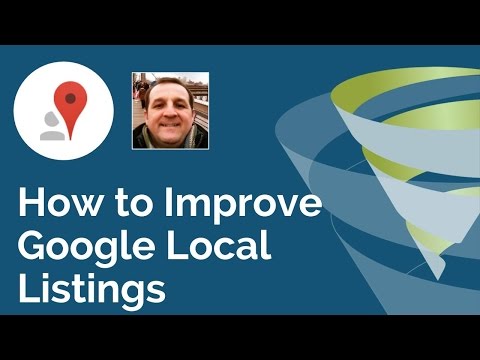
Proximity to the Search:
If the search is for “Hotels in Liverpool”, there’s a stronger signal for hotels which are near the geographic centre of Liverpool. A hotel in Maghull (on the outskirts of Liverpool), will rarely feature.
Quality Signals:
The number of reviews and the quality of those reviews is a significant ranking signal in the Local Stack. It is quite common for businesses with a weaker proximity signal to overcome that deficit with a stronger quality signal. Don’t get too hopeful though, even with 3x the number of reviews of the next best competitor, Maghull is just too far away from the geographic centre of Liverpool – the proximity signal is just way too weak. I guess opening a hotel closer to the middle of Liverpool is the only way to really address the proximity signal issue. Speak with a Specialist. Get a Free SEO Audit


